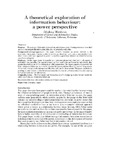| dc.contributor.author | Mutshewa, A. | |
| dc.date.accessioned | 2011-03-15T08:37:16Z | |
| dc.date.available | 2011-03-15T08:37:16Z | |
| dc.date.issued | 2007 | |
| dc.identifier.citation | Mutshewa, A. (2007) A theoretical exploration of information behaviour: a power perspective, Aslib Proceedings, Vol. 59, No. 3, pp. 249-263 | en_US |
| dc.identifier.issn | 0001-253X | |
| dc.identifier.uri | http://hdl.handle.net/10311/749 | |
| dc.description.abstract | The purpose of this article is to explore and propose a way of using power as a theoretical
anchor to investigate the information behaviour of people in work roles. The paper reviews literature on power relevant to the
information disciplines. Various models of power are described, and a more sophisticated view, which takes a relational approach to power, is used to suggest how information related behaviour could be investigated. In this paper, power is regarded as a pervasive phenomenon involved in all aspects of
individual lives, including the aspects emanating from work roles performed by individuals, thus
manifesting itself as part of the relationships in the organisation. The paper suggests a framework that
links information behaviour to power by arguing that power relations that form part of the processes
of the work roles induce the information behaviour exhibited by those people. The paper concludes by pointing to a need for information behaviour researchers to consider power as central to understanding
how people seek and use information.
The framework could be used as a tool for designing studies that will enable the
collection of data on information behaviour. | en_US |
| dc.language.iso | en | en_US |
| dc.publisher | Emerald | en_US |
| dc.subject | Behaviour | en_US |
| dc.subject | Information control | en_US |
| dc.subject | Knowledge management | en_US |
| dc.title | A theoretical exploration of information behaviour: a power perspective | en_US |
| dc.type | Published Article | en_US |

